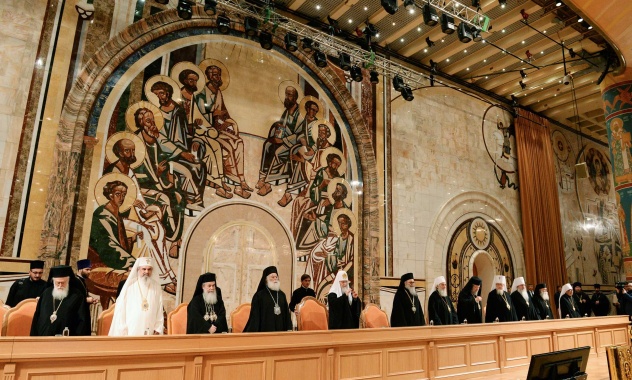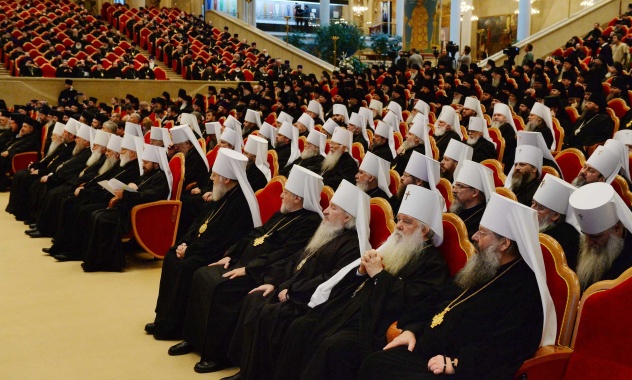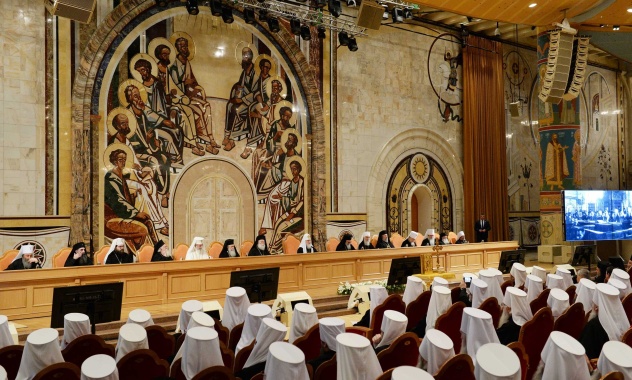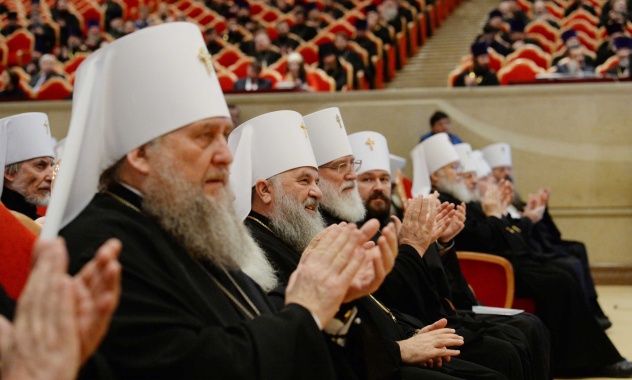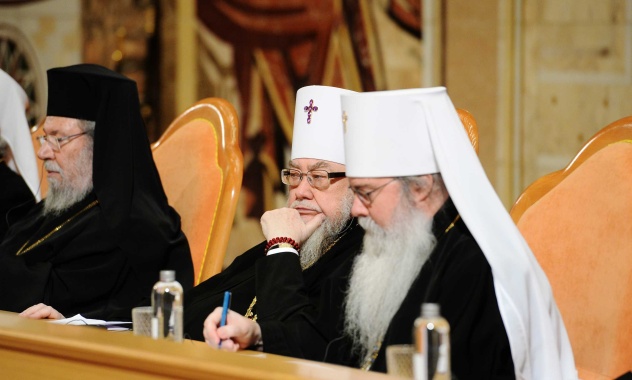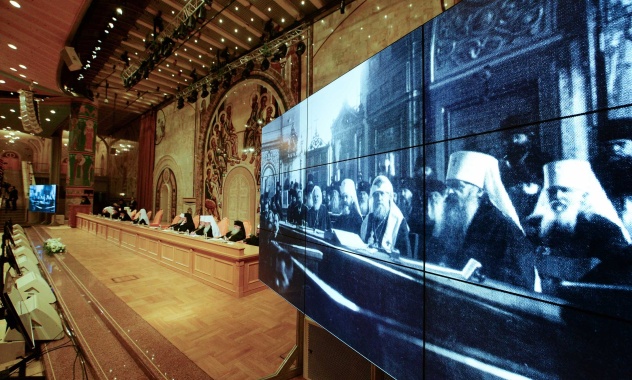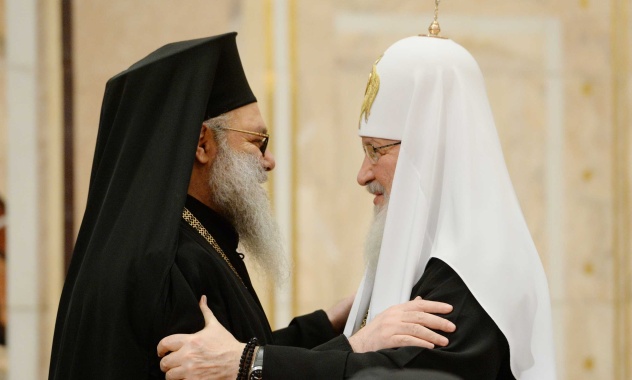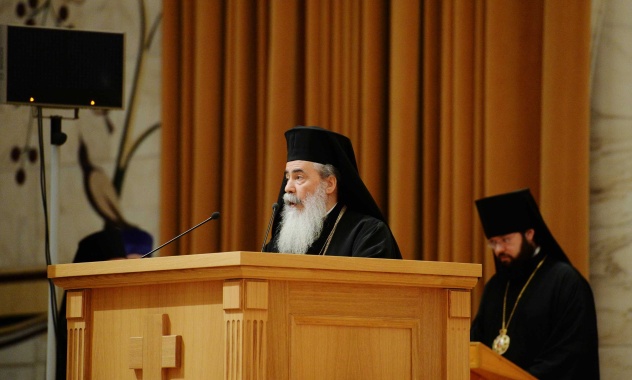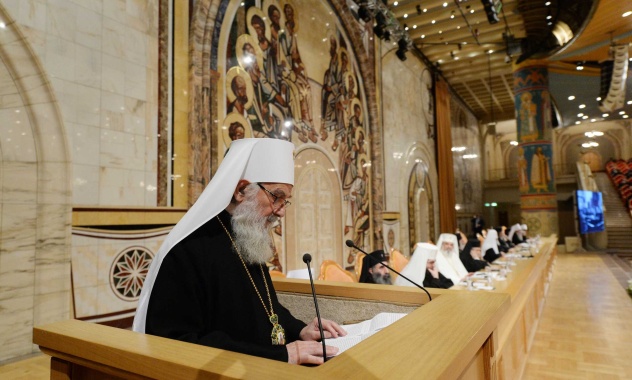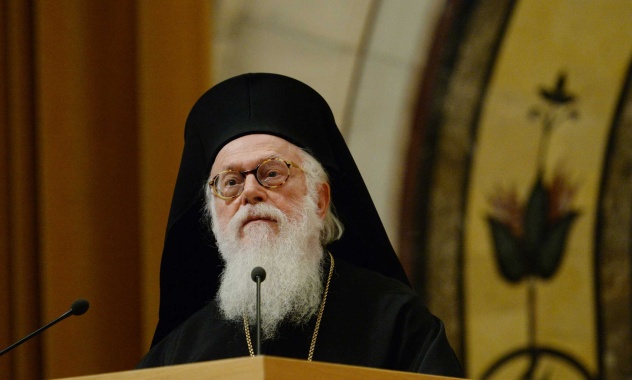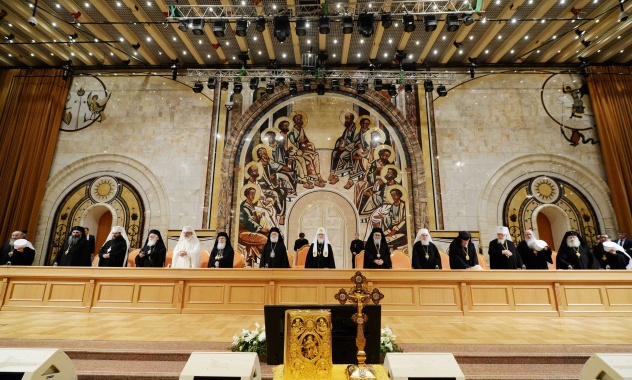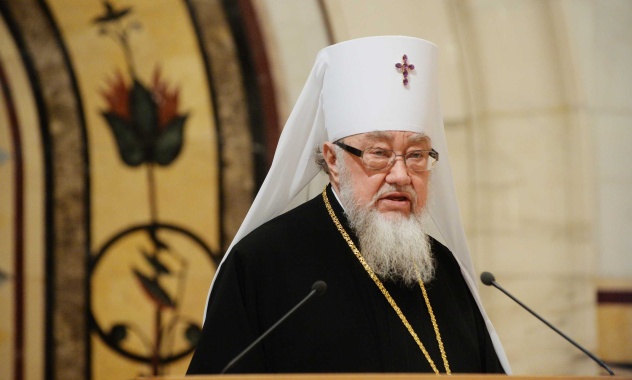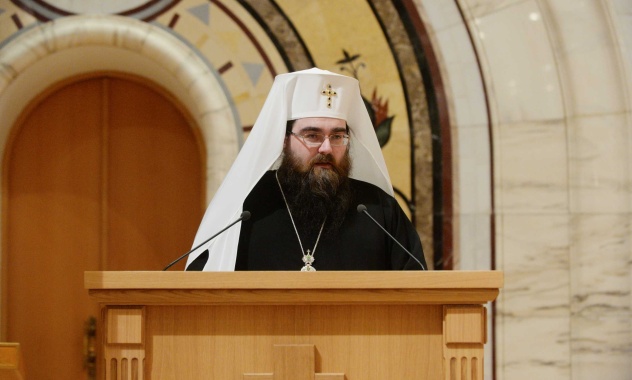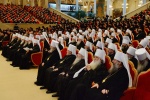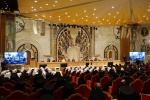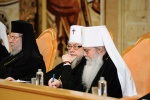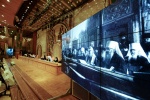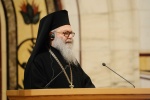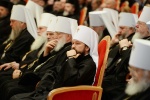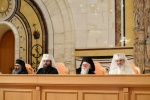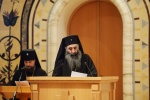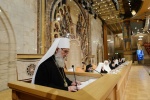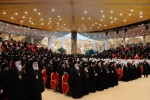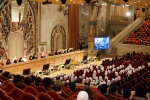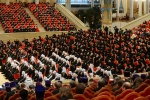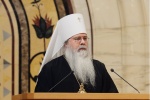Final session of the Bishops’ Council of the Russian Orthodox Church held with the participation of Primates and representatives of the Local Orthodox Churches
On 2 December 2017, the grand concluding meeting of the Sacred Bishops’ Council took place at the Church Councils Hall of the Cathedral of Christ the Saviour.
Taking part in the session chaired by His Holiness Patriarch Kirill of Moscow and All Russia were the Primates and representatives of the Local Orthodox Churches who had arrived in Moscow to attend the celebrations marking the centenary of the restoration of the Patriarchate in the Russian Church.
The presidium consisted of His Beatitude Pope and Patriarch Theodoros II of Alexandria, His Beatitude Patriarch John X of Antioch, His Beatitude Patriarch Theophilos III of Jerusalem, His Holiness Patriarch Irinej of Serbia, His Beatitude Patriarch Daniel of Romania, His Beatitude Archbishop Chrysostomos II of Cyprus, His Beatitude Archbishop Anastasios of Tirana and All Albania, His Beatitude Metropolitan Sawa of Warsaw and All Poland, His Beatitude Metropolitan Rastislav of the Czech Lands and Slovakia, His Beatitude Metropolitan Tikhon of All America and Canada, Metropolitan Theodore of Akhaltsikhe and Tao-Klarjeti – head of the delegation of the Georgian Orthodox Church, Metropolitan Gabriel of Lovech – head of the delegation of the Bulgarian Orthodox Church, His Beatitude Metropolitan Onufry of Kiev and All Ukraine, and Metropolitan Daniel of Tokyo and All Japan.
Among those present in the Church Councils Hall, along with the participants in the Bishops’ Council of the Russian Orthodox Church and members of the delegations of the Local Orthodox Churches, were representatives of the Moscow clergy.
Addressing all those in attendance, His Holiness Patriarch Kirill emphasized that the final session of the Bishops’ Council of the Russian Orthodox Church was dedicated to the centenary of the restoration of the Patriarchate in the Russian Church. ‘That event occurred at, perhaps, the hardest moment in our national history, when the revolutionary dismantle affected all spheres of life, when great many forces, both within and beyond the country, rebelled against the Church of God, and when the Church started to suffer from the bloody persecutions,’ His Holiness said, ‘Archpriest John Kochurov who died a martyr’s death in the Tsarskoye Selo, was the first among the victims killed before the election of His Holiness Patriarch Tikhon. Therefore, His Holiness was fully aware of what lot had been prepared from him when he heard the news about his election to the Patriarchal throne. And we know that His Holiness’s foreboding, unfortunately, came true. All the seven years of his service at the Patriarchal See were the years of confession of faith – not only because he risked his life daily or because he was imprisoned, but because every day he received reports about the atrocities committed against hierarchs and clergy of the Russian Orthodox Church, about the victims among our laypeople. He received reports about the destruction of churches and monasteries, as well as about the destruction of the millennia-old Orthodox tradition of our nation. He learned how the authorities in their fight against the Church did not only strike blows from outside, but also tried to destroy the unity from within, orchestrating the church schism.’
As the Primate of the Russian Orthodox Church noted, His Holiness Patriarch Tikhon did not live to see the time when the Church got at least relative opportunity for openly carrying out her service. ‘He did not live to see the glory of our Church and the spiritual revival of our nation, yet, we know that St. Tikhon sees everything from heaven and, being glorified as a saint, prays for our Church and for all our people,’ His Holiness added.
His Holiness cordially thanked the Primates of the Local Orthodox Churches and representatives of those Churches, whose heads had not been able to come to Moscow for objective reasons, for taking part in the Bishops’ Council of the Russian Orthodox Church and the celebrations. ‘Dear brothers, we take your visit as a sign of fraternal love and solidarity with the Russian Church, whose path in the 20th century was long and tragic,’ His Holiness Patriarch Kirill said, ‘We welcome you with especial love and respect, being aware that the Churches which you head and represent also endured hardships in their history. And some of the Churches represented here by the Primates even now are undergoing the hardest ordeals, losing their members. We pray to the Lord, beseeching Him to preserve all our Churches in unity, so that, notwithstanding sometimes very difficult and controversial circumstances, the plenitude of the Church might be still aware of the necessity to preserve, as their dearest treasure, the ecclesiastical unity. In unity is our strength, and through unity we express solidarity with all those suffering, in one Body of the Church of Christ.’
Metropolitan Hilarion of Volokolamsk, chairman of the Moscow Patriarchate’s Department for External Church Relations, read out the message of greetings sent to the Primate of the Russian Orthodox Church by His Holiness Patriarch Bartholomew of Constantinople.
Expressing his gratitude to His Holiness Patriarch Kirill for the invitation to come to Moscow to attend the celebrations marking the centenary of the convocation of the Local Council which, among other things, had restored Patriarchate in the Russian Church, abolished two centuries earlier by the state, the Primate of the Church of Constantinople also expressed his regret that he could not take part in the celebrations. ‘It does not mean, however, that the Mother Church of Constantinople will ever cease to pray for the good estate and success in God of your Most Holy Church under the guidance of her Patriarch, now Your dear Beatitude, whom we wish long and blessed Primatial ministry. We ask you to convey to all Their Eminences and Graces, your brothers the hierarchs, greetings and blessing from our Mother Church, which embraces them with respect and love and prays for their hierarchical selfless service to be always successful to the glory of God,’ the message reads.
‘I express my gratitude to His Holiness for this kind message and, taking this opportunity, I would like to wish him strength, good health and God’s help in shepherding the Church of Constantinople, in carrying out the special ministry pertaining to the cooperation with all the other Orthodox Churches, which His Holiness Patriarch Bartholomew performs with dignity,’ His Holiness Patriarch Kirill of Moscow and All Russia said after the message had been read out.
‘I feel the ineffable joy, having come here as Pope and Patriarch of Alexandria at the invitation of the respected sister Russian Orthodox Church to take part in the celebrations on the occasion of the centenary of the restoration of the Patriarchate of Moscow, All Russia and the Northern Lands,’ the Primate of the Orthodox Church of Alexandria said in his address at the grand meeting.
As His Beatitude noted, the restoration of the Patriarchal throne in Moscow was the most important event after its establishment. ‘The Russian Church foresaw that the restoration of the Patriarchal dignity under the new regime would be a firm guarantee of revival for the Russian people and of the preservation of their faith. Despite numerous afflictions and sufferings, she did not retreat, but got stronger and shone forth with new zealots of faith and godliness. The sorrow of the Russian Church was alleviated by the restoration of the Patriarchate. The Russian Church was crowned with the multitude of martyrs led by the Holy Patriarch Tikhon who had died in sufferings. She has never cut her ties with the people, always supporting them and together with them going through dangerous and endless ordeals,’ His Beatitude Pope and Patriarch Theodoros II of Alexandria said.
Presented to commemorate the celebrations was the omophorion, in which the Holy Patriarch Meletius Pigas of Alexandria had signed the Resolution of the Council concerning the granting of the Patriarchal dignity to the Russian Church.
‘Your Beatitude, I wholeheartedly thank you. I believe that my gratitude is shared by all the bishops, clergy and laypeople of our Church. You have presented us with a great historical shrine,’ His Holiness Patriarch Kirill said in response, noting that the omophorion will be kept at the museum of the Cathedral of Christ the Saviour.
‘The Antioch – the Church, wherein the disciples of Christ were first called Christians – greets the Holy Russia on this blessed day, when we are celebrating the centenary of the Moscow Local Council that reestablished the Patriarchal dignity of the Russian Church and restored the conciliarity of this Church after the two centuries,’ His Beatitude Patriarch John X of Antioch said in his address, ‘The Church of Antioch, sharing with her sister the Russian Church her joy today, asks St. Tikhon the Confessor for intercession, who by the grace of the Holy Spirit was elected by the members of the Local Council as Patriarch in order to guide this Church and shepherd her at the time of atheism and persecution.’
As His Beatitude emphasized, the Church of Antioch will always remember what support the Russian Church gave to her faithful in the beginning of the previous century in various spheres, providing free education and medical treatment for the poor. Neither will she forget the Russian Church’s assistance in providing pastors for the Church of Antioch and in building churches. ‘We particularly appreciate the role of the great Patriarch Tikhon in establishing the Antiochian hierarchy in America,’ Patriarch John added, ‘He consecrated the first metropolitan of the Church of Antioch on the American land – St. Raphael, Bishop of Brooklyn, who had studied in Constantinople and in Russia and was the archpastor for the Orthodox Arab-speaking Antiochians on the American continent.’
The Primate of the Church of Antioch also mentioned the current difficult situation of the Syrian people, noting that as the terrorism withdraws owing to the interference of the Russian army, and as there have appeared prospects for peaceful settlement, the one Orthodox Church is to do all within her power to preserve the unity of Syria and the return of the Syrian Christians to their land, as well as to restore the destroyed churches and monasteries and provide everything which is essential for the dignified life – employment opportunities, adequate nutrition, health services and education for those who have suffered at a cruel time in order to reveal the power of Christ.
Addressing His Holiness Patriarch Kirill, His Beatitude Patriarch John X emphasized that the Church of Antioch appreciated his position concerning the crisis in Syria, his compassion and noble deeds, such as the rendering of humanitarian aid. ‘We greatly appreciate Russia’s concern and efforts to destroy terrorism, restore peace in Syria and maintain stability in Lebanon,’ the Primate of the Church of Antioch said.
“Nothing can compare with the joy of the Antioch today, when it is participating in the radiant celebrations whose foundation was laid by the martyrs and confessors who took part in the Local Council of 1917 and whose deeds will be cherished by the whole Orthodoxy,’ the Patriarch of Antioch added, ‘The revival of the Holy Russia is a gift from above to our world. May God help us bear witness to this joy of resurrection through the prayers and intercession of the new martyrs and confessors, zealots of faith and pastors who shone forth in Russia and throughout the Orthodox world in the years of persecution.’
His Holiness Patriarch Kirill of Moscow and All Russia said in response, ‘Your Beatitude, you have deeply moved us by your heartfelt words concerning the current situation in the Middle East, by expressing appreciation for the role of Russia and the Russian Church in overcoming the problems which cause pain to the Syrian people, as well as the problems that exist in Lebanon – the problems of your Church. I assure you that all we do by God’s mercy we do with humility and with full conviction that it is essential to share resources with those who are really suffering these days. We believe that the lasting and just peace will be restored in Syria. We believe that the terrorism will be totally defeated, that the Syrian people will be liberated from this dreadful yoke, and that people will again be building up their life in the canonical territory of your Church. May God grant unto you strength and good health so that you continue to serve your pious and longsuffering people as their Patriarch.’
In his address to the participants in the grand meeting, His Beatitude Patriarch Theophilos III of Jerusalem said, ‘Having arrived from the Holy City of Jerusalem in the holy and longsuffering Russian land, we convey to you and the Sacred Bishops’ Council of beloved archpastors and to all our Russian Orthodox brothers the intransient message of hope from the Lord of glory, Who was born in Bethlehem, Christ the Godman Who lived in the humble Palestine land. We bless our brothers in Christ by the grace of the All-Holy and Life-Giving Lord.’
Addressing His Beatitude Patriarch Theophilos, the Primate of the Russian Orthodox Church said, “Your Beatitude, I cordially thank you for your moving words, in which we feel the spiritual strength and the power of witness coming from the shrines of the City of Jerusalem… You have a special mission – to pray on behalf of all and for all, for the whole Orthodox Church, for the entire humanity before the Golgotha and the Life-Giving Sepulchre and at other holy places which great many pilgrims from the lands of the historical Russia come to venerate. I thank you for taking pastoral care of these pilgrims.’
Metropolitan Theodore of Akhaltsikhe and Tao-Klarjeti read out a message of greetings from His Holiness and Beatitude Catholicos-Patriarch Iliya II of All Georgia.
‘On behalf of the Georgian Orthodox Church and on our behalf we congratulate you and share your spiritual joy over the event of utmost importance – the centenary of the Local Council of the Russian Orthodox Church, which took the historic decision to restore the Patriarchate,’ the message reads, ‘We share you feelings, for the Georgian Orthodox Church felt all the bitterness caused by the abolition of Patriarchate and autocephaly and then the great joy over their restoration…”
His Holiness Patriarch Kirill of Moscow and All Russia asked the head of the delegation of the Georgian Orthodox Church to convey his profound gratitude to His Holiness and Beatitude the Patriarch-Catholicos of All Georgia for these kind words and expressed his hope that the Lord would grant bodily and spiritual strength to Catholicos-Patriarch Iliya II and would help him for many years to serve for the good of the Holy Orthodox Church and for the benefit of his people.
‘It is a particular joy to us to be hear today, leading the delegation of the Serbian Church, in the capital city of Moscow, in the fraternal God-preserved Russia, on the day when the great Russian Church is celebrating an important historical date – the centenary of the restoration of the Patriarchate,’ His Holiness Patriarch Irinej said in his address. ‘My predecessors at the Patriarchal throne and all the Serbian people sincerely shared the joy of their Russian brothers when in the 16th century the Eastern Patriarchs, wise in God, led by His Holiness Patriarch Jeremiah of Constantinople, performed the great and very just deed, pleasing unto God – proclaimed the Moscow Patriarchate so that the Russians and the neighbouring small peoples, gravitating towards the holy Orthodox faith, might have their own Patriarch – of Moscow, All Russia and All the Northern Lands.’
‘The restoration of the Russian Patriarchate was a great deed. Such was the significance of this historic event that it happened to affect other Churches as well,’ Patriarch Irinej continued, ‘Less than two years had passed after the restoration of the Russian Patriarchate, when the Serbian Church got reunited within the largest historical area, in which the Serbian Orthodox population had spread, and in 1920 she renewed her ancient and honourable Patriarchal dignity, glorified in the centuries.’
As the Primate of the Serbian Church noted, the century that began with the event commemorated today, was not peaceful. ‘Our peoples suffered much at the hands of the enemies of faith, enduring dreadful and unprecedented torments and oppression. However, the more the Russian people suffered the stronger their will for salvation and their faith were. Feeble were the attempts of the servants of darkness to quench the light of the Orthodox faith. And now we see the Russian Church and her Patriarchate risen in the greatest, unexampled glory,’ Patriarch Irinej added.
Patriarch Kirill thanked the head of the Serbian Orthodox Church for the greeting, saying, ‘For us this is also a greeting from the Serbian people who are kin to us, close to us in language and culture, and whose history has so much in common with the history of the peoples of the Holy Russia. We endured the hardest ordeals when our lands were enslaved, we fought to preserve Orthodoxy, trying to endure those years of hardship when our Churches were oppressed on the ideological grounds in the 20th century. And today we rejoice, for our Churches, being part of the Universal Orthodoxy, together with all the other Churches carry out their conciliar work, bearing ever more active witness to Orthodoxy within their own countries and promoting this witness throughout the world.’
‘We are in Moscow today to celebrate together the centenary of the restoration of the Patriarchate in the Russian Orthodox Church,’ His Beatitude Patriarch Daniel of Romania said in his address, noting that the Holy Patriarch Tikhon had begun his service at a very difficult period in the history of the Russian people.
He said that ‘at that time the dignity and responsibility of the Patriarch of Moscow and All Russia faced with the great suffering because of the persecution carried out by the Bolshevik regime against the Church. The years to follow the restoration of the Patriarchate became ones of severe trials for the whole Russian Orthodox Church as thousands of clergy and monastics were killed; thousands of churches were closed up or destroyed before World War I’… He also said that on the solemn day when the centenary of the restoration of the Patriarchate is celebrated with the participation of representatives of autocephalous Orthodox Churches, ‘we find ourselves in a situation different from what it was in the period of communist persecution. It is a period of the freedom of witness to the faith as well as one of the great pastoral responsibility before new challenges facing today’s society’.
Speaking in response, Patriarch Kirill said, ‘I am glad that in the run-up to this celebration I had an opportunity to visit the sister Church of Romania. He said that during his recent visit to Bucharest he became a witness to the significant re-birth of the Romanian Orthodox Church as new churches were built and church life was re-organized.
The message of greetings from His Holiness Neophytus, Patriarch of Bulgaria, was read out by Metropolitan Gabriel of Lovech: ‘We are happy that on this solemn and festive day we share our common joy and the joy of the Holy Russian Orthodox Church so dear to our heart, which by God’s will, one hundred years ago – in the days tumultuous and fateful for fraternal Russia and the whole world, amid the fire of revolution and radical social changes, was able to restore the historical truth by reclaiming the Patriarchal status’, the message reads, ‘On the day when the centenary of the restoration of her Patriarchal status is celebrated, we all wish her every blessing from the Lord, all possible growth in the love of Christ and great successes in her internal and external mission. May God always be with all of you – the holy authority, clergy and laity of the Russian Orthodox Church. May the respect and love of the whole Orthodox world always invariably surround you so that you may continue playing the role which you have always played in the history and life of Holy Orthodoxy!’
In his message, Patriarch Neophytus points out that for the common witness of the Orthodox Church, her role and mission in the world it is especially important that ‘the glorious and much-suffered Russian Orthodox Church should continue to occupy today her exclusive place in the Orthodox world as a Church, which has gone through so many trials and withstood internal and external threats and persecution and come out of the fire of martyrdom purified and ever more strong in her internal life, respected in inter-Orthodox relations with all the Orthodox Churches in her bright witness to Crucified Christ’.
Patriarch Kirill asked the Bulgarian delegation to convey to Patriarch Neophytus ‘our gratitude, love, and prayers for his speedy recovery.’
The Bulgarian people and the peoples of Holy Russia are tied by bonds of cultural communality, linguistic communality and, most importantly, the Orthodox faith, His Holiness stated stressing, ‘In spite of the fact that all kinds of things happened in history, the spiritual ties between people have always been preserved. And the guardian of these bonds are not political regimes or ideology but the Orthodox Church. The Russian and Bulgarian Churches have preserved these spiritual ties, cultivating them in their peoples. God grant that it may continue and that our Churches, together with all the Orthodox Local Churches, may serve the cause of unity of Holy Orthodoxy and Christian Orthodox witness before the whole world.’
In his turn, His Beatitude Chrysostomos, Archbishop of Cyprus, in his address to the Bishops’ Council final session, said, ‘Together with you, Your Beatitude Patriarch of Moscow and All Russia and the Most Reverend Participants in the Council, we turn our minds and hearts to all the known and unknown heroes, upholders of the faith, who by their feats helped to restore the Patriarchate in Russia and have given us joy of these celebrations. God, who wants all people to be saved and to come to a knowledge of the truth (1 Tim. 2:4), by His inscrutable providence made it possible that at the same time with the restoration of Patriarchate, gusty anti-church winds might blow in this country, inflicting wounds and seriously threatening the pious Russian people for over seventy years. In those hard times, looking at the Russian Orthodox Church we could see that she was like a solid rock in a foaming sea…’ Archbishop Chrysostomos said that her Patriarchs and bishops manifested fearlessness in the critical situation, carrying on their pastoral work. They proved in deed what the Church has always confessed: that throughout her two-millennia-long journey, martyrdom has been the most essential manifestation of her self-awareness. ‘They have taught us that even in the hardest situation a believer can be happy and feel joy of the hope for to-morrow which will be a better one,’ the head of the Church of Cyprus added. He stated that the successful march of Christians through the period when a host of new martyrs was revealed has led the Russian Church to her free existence in the Orthodox world today.
Speaking about today’s world situation, Archbishop Chrysostomos mentioned the Orthodox East as it sees materialism, mechanicism, relativism being brought there from the West… Though the scientific progress has made life more comfortable and made it possible to raise its quality, we become increasingly aware of the words of Christ that man shall not live on bread alone (Lk. 4:4). Driving God away from man’s life, various social systems proclaim that ‘in the beginning is ‘economics,’ but actually ‘in the beginning’ for the Church is the human being – this unique creation of God.
Responding to the statements made by Patriarch Kirill, Archbishop Chrysostom said that the Patriarch’s words about what is happening today to the human race are prophetic. These words he believes are a call for the one Church to bear witness to the world different from ‘the broad way,’ which is absorbing almost all the human community. It is difficult to walk against the current, but the Lord said that only a narrow way leads to the Heavenly Kingdom. It is very important that the Church should not lose her vigor in her witness to this narrow way before the world. And the words we have just heard, he said, help us to become aware of our common responsibility not only for our One Holy Catholic and Apostolic Orthodox Church but also for the human race.
Archbishop Anastasios of Tirana and All Albania spoke about the bright leaders and myriads of clergy and laity who, during that ‘long night’ of persecution, remained, as Patriarch Tikhon predicted, steadfast in their faith and joyous in the Holy Spirit in the midst of severe suffering (cf. 1 Thes. 1:6). The personality of Patriarch Tikhon of Moscow reminds the Orthodox of their constant duty to carry out mission, to oppose schismatic aspirations for the sake of unity and to seal their love of Christ by martyrdom. In this way St. Tikhon fulfilled his apostolic and pastoral duty, baring his witness by deed and blood both inside and outside the country.
Addressing Archbishop Anastasios, Patriarch Kirill said, ‘We heard your testimony with special attention also because you are the first Primate of the Albanian Church, which has been raised from the dead after a total destruction. And we cherish the experience of your Church and understand the tragedy of the Orthodox people of Albania as they are similar to our understanding of history and our view of the past, which you have described so brightly, and at the same time to our view of the future.’
Metropolitan Sawa of Warsaw and All Poland, in his speech, cited the Holy Patriarch Tikhon as an example of faithfulness to Christ, hope, reconciliation and love. The faithful of the Polish Church remember him with love also because he was rector of Holm Seminary and later Bishop of Lublin, vicar of the diocese of Warsaw and Holm. During his episcopal service he visited 110 parishes of the diocese. ‘It is gratifying that today we can be with you all and bear witness to it, beseeching: Holy Hierarch Tikhon, pray to God for us!’ he said.
Patriarch Kirill thanked the Primate of the Polish Church for his words, stressing, ‘May God help us all together and each Church in particular to bear witness before the world without which there will be no way, no life, but something which can threaten the very survival of the human race.’
His Beatitude Rastislav, Metropolitan of the Czech Lands and Slovakia, spoke about the Local Council of the Russian Orthodox Church, which took place during the hard historical radical turn in October 1917, as it resolved that Patriarchate be restored in the Russian Orthodox Church. Already in November, Metropolitan Tikhon of Moscow and Kolomna was elected Patriarch of Moscow and All Russia. It was a most important event not only for the Russian Orthodox Church but also for the whole Universal Orthodoxy, including our Local Church, he said. ‘It was the Patriarch,’ he continued, ‘who became a spiritual beacon pointing to the right way in the time of political chaos, devastation and spiritual destitution. The Orthodox Church, however, not only held out and revived notwithstanding the severe persecution and humiliation but also helped our sister Local Orthodox Churches including the much-suffered Church of the Czech Lands and Slovakia.’
Patriarch Kirill responded by saying that, aware of the difficult history of the Metropolitan’s Church, the Russian Orthodox Church, at a hard time and for historical reasons, had to take upon herself the responsibility for the preservation of Orthodoxy in the Czech Lands of Slovakia. ‘We pray,’ he said, ‘that the Lord may preserve her in unity and her missionary power so essential for the enlightenment of the people around her and support of the faith of her faithful.’
His Beatitude Tikhon, Metropolitan of All America and Canada, spoke about Bishop Tikhon’s vision of Orthodoxy in America ‘in which the future united Orthodox Church in the New World would include all the national Orthodox communities, with Arabic, Greek and Serbian bishops leading those communities – all united in one Archdiocese led by a Russian Orthodox Archbishop. There is even a written record showing that Archbishop Tikhon saw a future autocephalous Orthodox Church in the New World.’ He pointed out that ‘the restoration of the Patriarchate in 1917 was not simply an administrative and ecclesiastical decision borne out of historical necessity, but was truly a prophetic event that placed a man of a great integrity and holiness in a position which would become the heaviest of crosses for him, but the source of unity for his flock.’ He stressed that ‘even in the midst of the fiery trials, Saint Tikhon stood as an image of “meekness in authority” and an icon of the extreme humility and sacrificial love of Jesus Christ. And today, his life and legacy offer all of us hope that our yearning for a better way of life can be found in the Church, even in this post- and anti-Christian world.’
Addressing His Beatitude, Patriarch Kirill thanked him for honouring the memory of St. Tikhon, especially in connection to his missionary work in America. ‘It is good that you have drawn a connecting line between his service in America and election to the Patriarchal see. Nothing happened without God’s providence, and our Church at her most difficult time came to be headed by a man of great life experience and, I can say, not a provincial but a global vision of the life of Orthodoxy. It certainly helped His Holiness Tikhon to inspire and strengthen both those who were around him and all the Orthodox people,’ the Primate of the Russian Church said.
‘Besides, and perhaps the most important thing to be stated, is that His Holiness Tikhon lived a very rich spiritual life, and precisely this inner spiritual power inspired everyone who came in touch with him,’ Patriarch Kirill continued, ‘There was no external glory or age-old protocol that surrounds the Patriarch of a Church. His Holiness Tikhon had no opportunity for carrying out his service as Primates of Local Church do, but it was in the humiliation he endured that his spiritual power was revealed. It was this spiritual power that gave strength to those who doubted, who were seized by fear, who were ready to waver and fly the track. The personal example of His Holiness stopped very many from committing mistakes, including Orthodox hierarchy and clergy. And most of those who did the mistake of falling unto a schism, those who survived, ultimately returned to the fold of the Holy Orthodox Church, the Church which the persecutors called with disdain ‘Tikhon’s one’ but which revealed her power to all the people and to the whole Universe.’
Patriarch Kirill thanked all the Primates and representatives of the Local Orthodox Churches ‘who have shared these sacred remembrances with us and shared in our celebrations in honour of the centenary of the restoration of Patriarchate in the Russian Church.’
Patriarch Kirill also thanked all the archpastors who came to Moscow for the Bishops’ Council of the Russian Orthodox Church and announced the Council adjourned.
DECR Communication Service
Other events
-
02.12.2017 23:58Final session of the Bishops’ Council of the Russian Orthodox Church held with the participation of Primates and representatives of the Local Orthodox Churches
-
02.12.2017 16:50Bishops’ Council of the Russian Orthodox Church adopts its final documents
-
02.12.2017 14:00Resolutions of the Holy Bishops’ Council of the Russian Orthodox Church (29th November – 2nd December 2017)
-
02.12.2017 13:58Message by the Holy Episcopal Council to the Clergy, Monks and Nuns and All Faithful Children of the Russian Orthodox Church
-
01.12.2017 18:48Speech by His Holiness Patriarch Kirill at the Meeting of the President of Russia Vladimir Vladimirovich Putin with the Participants of the Episcopal Council of the Russian Orthodox Church
-
01.12.2017 18:38Speech by the President of Russia Vladimir Vladimirovich Putin before the Participants of the Episcopal Council of the Russian Orthodox Church
-
01.12.2017 16:30Briefing on situation around former Metropolitan Philaret of Kiev’s appeal
-
01.12.2017 12:38Bishops’ Council of the Russian Orthodox Church begins its third day
-
30.11.2017 23:56Metropolitan Hilarion of Volokolamsk comments on spreading reports on the appeal of the former Metropolitan of Kiev and All Ukraine
-
30.11.2017 23:50Bishops’ Council of the Russian Orthodox Church completes its second day work
-
30.11.2017 23:45Bishops’ Council of the Russian Orthodox Church adopts a Resolution ‘On the Appeal of the former Metropolitan Philaret of Kiev and All Ukraine’
-
30.11.2017 23:30Former Metropolitan Philaret of Kiev and All Ukraine: ‘I ask for your forgiveness in everything in which I sinned by word, deed and all my feelings’
-
30.11.2017 12:12Report by Metropolitan Onufry of Kiev and All Ukraine to the Russian Orthodox Church Bishops’ Council (November 29-December 2, 2017)
-
30.11.2017 12:08His Beatitude Metropolitan Onufry of Kiev and All Ukraine gives an address at the Bishops’ Council
-
30.11.2017 12:05Second day of the Bishops’ Council’s work
-
29.11.2017 22:30METROPOLITAN HILARION OF VOLOKOLAMSK SPEAKS AT THE SESSION OF THE EPISCOPAL COUNCIL OF THE RUSSIAN ORTHODOX CHURCH ON THE RESULTS OF STUDYING THE DOCUMENTS OF THE COUNCIL ON CRETE
-
29.11.2017 22:15HIS HOLINESS PATRIARCH KIRILL: “THE MEETING ON CUBA WAS AN IMPORTANT STEP ON THE WAY TO RESOLVING THE MORE RELEVANT ISSUES OF THE MODERN-DAY WORLD BY THE JOINT EFFORTS OF THE TWO LARGEST CHURCHES OF THE CHRISTIAN WORLD”
-
29.11.2017 21:28His Holiness notes positive dynamics in Church-state cooperation in Uzbekistan
-
29.11.2017 21:25His Holiness Patriarch Kirill expresses hope that the dialogue between the Church and Turkmenistan’s leadership will help resolve current difficulties
-
29.11.2017 21:22His Holiness specifies pressing problems of the Orthodox Church in Tajikistan
-
29.11.2017 21:20Primate of the Russian Church expresses satisfaction with the level of Church-state cooperation in Kyrgyzstan
-
29.11.2017 21:18His Holiness Patriarch Kirill: Republic of Kazakhstan has been giving an example of constructive Church-state relations for many years
-
29.11.2017 21:17His Holiness Patriarch Kirill: Dialogue of Azerbaijani authorities with Diocese of Baku offers ample opportunities for solving problems of the Orthodox
-
29.11.2017 21:16His Holiness Patriarch Kirill notes a high level dialogue between the Church and the state in Belarus
-
29.11.2017 21:14Positive tendencies in church-state relations in Moldova are noted in the report of His Holiness the Patriarch at the Bishops’ Council
-
29.11.2017 21:10His Holiness Patriarch Kirill: Peacemaking heroic deeds of the Ukrainian Orthodox Church show its true patriotism
-
29.11.2017 19:35HIS HOLINESS PATRIARCH KIRILL: “SIN OUGHT TO BE EXPOSED, BUT WE SHOULD NEVER HUMILIATE ANYONE”
-
29.11.2017 18:51HIS HOLINESS PATRIARCH KIRILL: “COMMUNICATING WITH THE MEDIA IS A CHANCE TO SPEAK ABOUT THE GOSPEL IN AN ACCESIBLE LANGUAGE ON ISSUES WHICH AFFECT TODAY’S PEOPLE”
-
29.11.2017 17:38His Holiness Patriarch Kirill told members of the Bishops’ Council about the preparation of the Catechesis of the Russian Orthodox Church
-
29.11.2017 17:34Primate of Russian Church calls to adopt more systematic approach in opposing sectarianism and neo-paganism
-
29.11.2017 17:27His Holiness Patriarch Kirill: What is sometimes forgotten in pursuit of different technologies is that mission is not a collection of methods, but practical work
-
29.11.2017 17:24His Holiness Patriarch Kirill: The main task of the Church is not to fill children’s mind with vast knowledge, but to help them enter into its life
-
29.11.2017 17:18Primate of Russian Orthodox Church: Theology should be regarded not only as a set of subjects taught at seminaries, but also as a serious science
-
29.11.2017 17:08Reorganization of the system of theological education remains priority for supreme church authorities
-
29.11.2017 17:06His Holiness Patriarch Kirill: While inviting young people to dialogue and using their language, the Church must not lose its integrity
-
29.11.2017 16:59Patriarch Kirill: For the youth it is important that Christianity is a religion of freedom, not a religion of bans
-
29.11.2017 14:33Patriarch Kirill: Signing the Act of Canonical Communion has given us joy over the unity of the faithful of the one Russian Orthodox Church
-
29.11.2017 14:32Patriarch Kirill announces statistical data on the life of the Russian Orthodox Church
-
29.11.2017 14:28Bishops’ Council given information on Patriarch ministry in inter-council period
-
29.11.2017 14:19Patriarch Kirill: Continued attempts are made to impose on the Church a life according to the rules of this world
-
29.11.2017 14:10THE FIRST HIERARCH OF THE RUSSIAN ORTHODOX CHURCH : THE MINISTRY OF THE BISHOP IS INEXTRIABLY LINKED TO THE ORTHODOX UNDERSTANDING OF CONCILIARITY
-
29.11.2017 14:07HIS HOLINESS PATRIARCH KIRILL: THE LOCAL COUNCIL OF 1917-1918 WAS TRULY AN EXTRAORDINARY PEHNOMENON IN THE HISTORY OF THE CHURCH
-
29.11.2017 14:04HIS HOLINESS PATRIARCH KIRILL: THE MAIN HERITAGE OF THE NEW MARTYRS IS THEIR LOVE OF CHRIST AND NEIGHBOUR, FOR WHOM THEY LAID DOWN THEIR LIVES
-
29.11.2017 14:01Opening of the Bishops’ Council of the Russian Orthodox Church
-
29.11.2017 13:56President of Kazakhstan Nursultan Nazarbayev sends greetings to participants in Bishops’ Council of the Russian Orthodox Church
-
29.11.2017 13:55President of Moldova Igor Dodon sends greetings to participants in Bishops’ Council of the Russian Orthodox Church
-
29.11.2017 13:53President of Belarus Alexander Lukashenko sends greetings to participants in the Bishops’ Council of the Russian Orthodox Church
-
29.11.2017 13:50President Putin’s message of greetings to the Bishops’ Council of the Russian Orthodox Church







